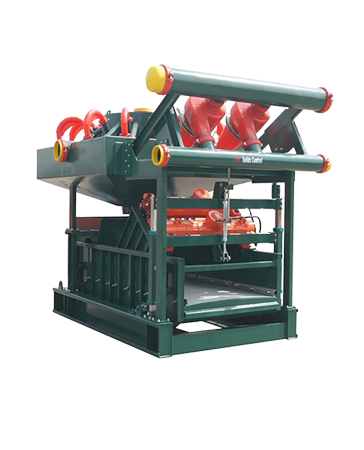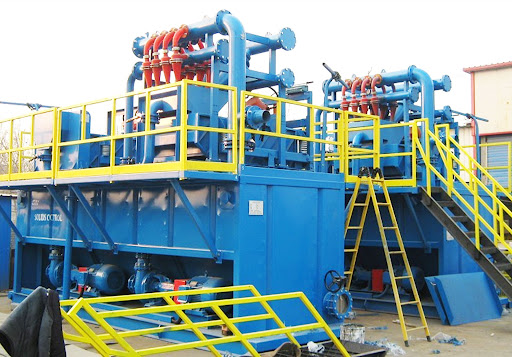Solid Control and Slurry Solutions
Solid Control and Slurry Solutions are essential for many drilling operations, including oil and gas exploration, geotechnical drilling, and mining. These solutions are designed to manage drilling fluids and control the solids that are generated during the drilling process.
Drilling fluids, also known as muds, are designed to lubricate and cool the drill bit, transport cuttings to the surface, and maintain the stability of the borehole. However, these fluids can become contaminated with solids, oil, and other contaminants during the drilling process. Contaminated drilling fluids can negatively impact the drilling process, reduce drilling efficiency, and increase costs.
Solid control in the context of drilling operations refers to the management and separation of solids from the drilling fluid or mud during the drilling process. The primary goal is to maintain the properties of the drilling fluid for efficient drilling while removing undesirable solids, such as drill cuttings and other debris, to prevent equipment damage and maintain wellbore stability.
Slurry solutions often involve the preparation and management of slurries, which are mixtures of solids (usually fine particles) in a liquid medium. Slurry Solutions are used in a range of industries, including mining, construction, and environmental remediation. These solutions are designed to transport solids and other materials through pipelines, improve process efficiency, and minimize environmental impacts.
Solid control and slurry solutions are integral components of drilling operations, contributing to efficient and environmentally responsible drilling practices. The selection and implementation of solid control equipment and slurry solutions depend on the specific drilling conditions, objectives, and environmental considerations. This process typically involves a combination of mechanical, chemical, and electrical treatments to separate and remove solids.
Mechanical Treatment
Mechanical treatment in solid control refers to the use of various mechanical equipment and processes to separate, remove, or manage solid particles from drilling fluids during drilling operations. The objective is to maintain the properties of the drilling fluid while effectively removing undesirable solids, such as drill cuttings, to ensure efficient drilling and protect drilling equipment. Here are key mechanical treatments commonly employed in solid control:
- Shale shakers are vibratory screening devices used to separate coarse drill cuttings from the drilling fluid. They use mesh screens to allow liquid to pass through while retaining solids.
- desanders are hydrocyclone devices designed to remove sand-sized particles from the drilling mud. They operate on the principle of centrifugal force.
- Centrifuges use high-speed rotation to separate solids from the drilling fluid. They are particularly effective in separating fine solids.
- Mud cleaners integrate desanders, desilters, and a shale shaker to provide comprehensive solid control. They remove both large and fine particles from the drilling mud.


Chemical Treatment
Chemical treatment in solid control involves the use of various chemical additives to enhance the performance of drilling fluids, control the properties of the fluid, and aid in the separation and removal of solid particles during drilling operations. The application of chemical treatments can improve the efficiency of solid control equipment and contribute to maintaining the desired properties of the drilling fluid.
Properly selected and applied chemical treatments play a crucial role in optimizing solid control processes, contributing to efficient and environmentally responsible drilling operations. The choice of chemical additives should be based on the specific characteristics of the drilling fluid and the drilling conditions.
Polymers such as polyacrylamides are one of the important chemical additives, which are used as flocculants to promote the aggregation of fine solid particles into larger, more easily removable masses. Additionally, polymers can be used to control the viscosity of the drilling fluid.
Electrical Treatment
Electrical treatment involves using electrical fields to separate solids from the drilling fluids. This process is often used in conjunction with mechanical or chemical treatments to further remove solids.
Benefits of solid control in drilling
Maintained Drilling Fluid Properties
Solid control processes help maintain the desired properties of the drilling fluid, such as viscosity, density, and PH. This ensures the fluid’s effectiveness in carrying cuttings to the surface, cooling and lubricating the drill bit, and providing stability to the wellbore.
Reduced Equipment Wear and Damage
By removing solid particles, including abrasive drill cuttings, solid control minimizes wear and damage to drilling equipment such as the drill bit, pumps, and mud circulation system. This extends the lifespan of equipment and reduces maintenance costs.
Wellbore Stability
Solid control helps maintain wellbore stability by preventing the invasion of solid particles into the formation. This is crucial for preventing wellbore collapse, maintaining hole integrity, and facilitating successful well completion.
Environmental Protection
Proper solid control practices minimize the discharge of drilling mud with contaminants into the environment. This helps protect surrounding ecosystems, water bodies, and wildlife, aligning with environmental regulations and sustainable drilling practices.
Improved Safety
The removal of solid particles from the drilling fluid contributes to a safer working environment. It reduces the risk of equipment malfunctions, wellbore instability, and other issues that could pose safety hazards to personnel on the drilling rig.
Optimized Drilling Fluid Performance
Solid control ensures that the drilling fluid functions optimally by preventing contamination and maintaining the proper balance of additives. This is crucial for achieving the desired drilling outcomes.
Prevention of Formation Damage
Effective solid control minimizes the introduction of solid particles into the formation. This helps prevent formation damage, such as the plugging of pore spaces, which can impact reservoir productivity.
At AIMEQUIP, we specialize in Solid Control and Slurry Solutions. We offer a range of technologies and services to help you effectively manage your waste streams and ensure compliance with environmental regulations. Our team of experts can help you select the right technology for your application, provide installation and maintenance services, and ensure that your operations are operating efficiently and cost-effectively. Contact us today to learn more about our Solid Control and Slurry Solutions
